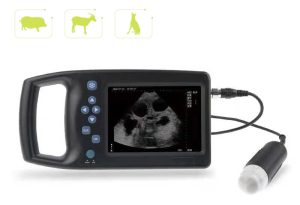Diagnosis of several gastrointestinal diseases in sheep with B-ultrasound
Belly distension of sheep: The left skin of sick sheep is rapidly swollen due to excessive gas in the rumen, with drum sounds on percussion, strong elasticity on palpation, dull spirit, loss of appetite, restlessness in rising and lying, arching the back and moaning, looking back at the abdomen. In severe cases, the breathing speeds up and death from exhaustion occurs. When diagnosing this disease, it is also possible to use B-ultrasound to check the rumen status of sheep for auxiliary diagnosis.
Prevention: Feed less fermentable succulent feed to prevent sheep from eating spoiled or poisonous forage and poisonous insects, and often use B-ultrasound to check the rumen status of sheep. Treatment: rumen massage, gavage with anti-fermentation agent, rumen puncture to exhaust gas, and rumen peristalsis drugs attached. B-ultrasound examination for sheep can be used after treatment.

Abdominal relaxation in sheep: caused by decreased peristaltic function of the anterior stomach, clinically manifested as indigestion. The cause of the disease is long-term feeding of poor quality and indigestible forage, or too much concentrate and too little grass, which makes the gastrointestinal burden too heavy to adapt to, and even insufficient drinking water, improper feeding methods, and mutations in forage can also cause the disease. , When diagnosing this disease, it can be found that the front gastric peristalsis is slow on sheep B-ultrasound.
Sick sheep are depressed, thin and weak, with dry nose, often lying on the ground, loss of appetite and refusal to eat, but reduced or stopped, slow gastric motility, due to the large amount of gas produced after the corruption of the stomach content, the left thigh is slightly enlarged and flatulence occurs, The smell is foul; constipation and diarrhea occur alternately in sick sheep. It can be treated with anti-inflammatory, laxative, and digestive aids, and high-quality feed diet therapy. And use B-ultrasound for sheep to check the situation after treatment.
Food poisoning: caused by short-term or long-term eating of poisonous grasses, severe onset, massive salivation, diarrhea from upper leaves, cessation of feeding, abdominal pain, conjunctival congestion, dyspnea, cold ears and nose, and severe cases will die soon. Symptomatic treatment can be done by urging leaves, laxatives, protecting conjunctiva, relieving toxicity and expelling poison. After the treatment of this disease, it is necessary to use B-ultrasound for sheep to conduct a comprehensive examination.

